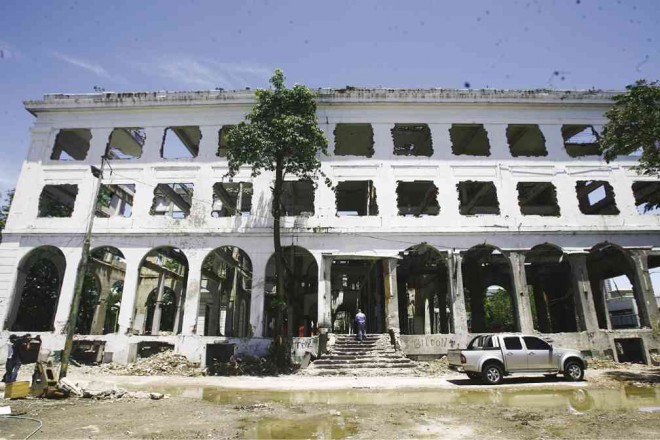
CAN IT BE SAVED? What’s left of the Manila Army and Navy Club after the demolition works initiated by a private developer which plans to transform the site into a five-star boutique hotel. JOAN BONDOC
MANILA, Philippines–Manila Mayor Joseph Estrada has thrown his support behind the restoration of the Manila Army and Navy Club, an American-era building on Roxas Boulevard, which was already partially demolished by a private developer when a national government agency intervened last month.
“(It) should be fully restored to its former beautiful appearance, inside and out… to its original glory, so it can attract more tourists and business into our city,” Estrada said in a statement Sunday.
The mayor and former President issued the call amid the controversy surrounding the recent demolition of the building, which was constructed in 1911 to host the first American social club in the Philippines, mainly for the use of US military and civilian personnel. The club’s first headquarters was in Intramuros.
Designed by William Parsons and built by the US Army engineering corps, the building also served as a shelter against Japanese attacks during World War II.
The National Historical Commission of the Philippines (then called the National Historical Institute) declared it a national historical landmark in April 1991. Despite this status, however, the building fell into neglect until restoration plans were first considered in 2007.
The NHCP issued a cease and desist order against property developer Oceanville Hotel and Spa Corp. after it demolished the primary structure in the Army and Navy Club complex despite having only demolition permits for two auxiliary structures in the compound.
Heritage advocates and conservationists have assailed what they called the arbitrary demolition of the main structure, which also prompted a Senate inquiry led by Sen. Pia Cayetano last month.
However, Oceanville defended its actions, saying the primary structure’s integrity had already been compromised after years in disrepair. The company, which plans to transform the site into a five-star boutique hotel, has promised to be faithful to the original design when it develops the area.
The Manila City government also cited a report from engineering firm AMH Philippines Inc., which noted that the Army and Navy Club building’s foundations have already deteriorated due to wear and tear and thus need to be retrofitted.
The main building was always flooded, it noted. Water from the Manila Bay has also seeped into the foundations of the two buildings.
In this context, Estrada said, “the restoration is a matter of extreme necessity. Otherwise, the historic landmark will continue to rot and decay.”
The mayor urged heritage advocates to support the restoration effort.
“It is a good thing that some civic-spirited groups and businessmen have pledged support. We hope that instead of criticizing, some sectors should join the effort and restore the landmark into its old original glory,” he said.–Nathaniel R. Melican